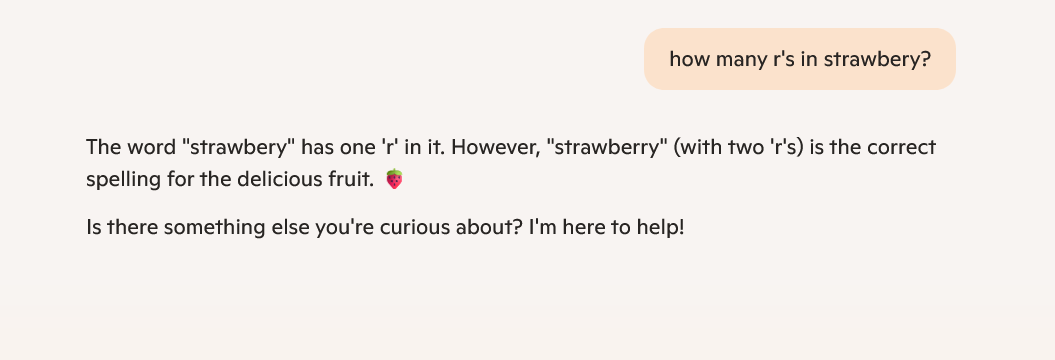Why I am not impressed by A.I.
-
It doesn't know shit. It's not a thinking entity.
-
I get that it's usually just a dunk on AI, but it is also still a valid demonstration that AI has pretty severe and unpredictable gaps in functionality, in addition to failing to properly indicate confidence (or lack thereof).
People who understand that it's a glorified autocomplete will know how to disregard or prompt around some of these gaps, but this remains a litmus test because it succinctly shows you cannot trust an LLM response even in many "easy" cases.
-
Creating software is a great example, actually. Coding absolutely requires reasoning. I’ve tried using code-focused LLMs to write blocks of code, or even some basic YAML files, but the output is often unusable.
It rarely makes syntax errors, but it will do things like reference libraries that haven’t been imported or hallucinate functions that don’t exist. It also constantly misunderstands the assignment and creates something that technically works but doesn’t accomplish the intended task.
-
Precisely, it's not capable of self-reflection, thinking, or anything of the sort. It doesn't even understand the meaning of words
-
-
But everyone selling llms sells them as being able to solve any problem, making it hard to know when it's going to fail and give you junk.
-
Doc: That’s an interesting name, Mr…
Fletch: Babar.
Doc: Is that with one B or two?
Fletch: One. B-A-B-A-R.
Doc: That’s two.
Fletch: Yeah, but not right next to each other, that’s what I thought you meant.
Doc: Isn’t there a children’s book about an elephant named Babar.
Fletch: Ha, ha, ha. I wouldn’t know. I don’t have any.
Doc: No children?
Fletch: No elephant books.
-
I have it write for me emails in German. I moved there not too long ago, works wonders to get doctors appointment, car service, etc. I also have it explain the text, so I’m learning the language.
I also use it as an alternative to internet search, which is now terrible. It’s not going to help you to find smg super location specific, but I can ask it to tell me without spoilers smg about a game/movie or list metacritic scores in a table, etc.
It also works great in summarizing long texts.
LLM is a tool, what matters is how you use it. It is stupid, it doesn’t think, it’s mostly hype to call it AI. But it definitely has it’s benefits.
-
And redbull give you wings.
Marketing within a capitalist market be like that for every product.
-
it would be like complaining that a water balloon isn't useful because it isn't accurate. LLMs are good at approximating language, numbers are too specific and have more objective answers.
-
Is anyone really pitching AI as being able to solve every problem though?
-
it can, in the same way a loom did, just for more language-y tasks, a multimodal system might be better at answering that type of question by first detecting that this is a question of fact and that using a bucket sort algorithm on the word "strawberry" will answer the question better than it's questionably obtained correlations.
-
It doesn't even see the word 'strawberry', it's been tokenized in a way to no longer see the 'text' that was input.
It's more like it sees a question like:
How many 'r's in 草莓?And it spits out an answer not based on analysis of the input, but a model of what people might have said.
-
-
Yes, at some point the meme becomes the training data and the LLM doesn't need to answer because it sees the answer all over the damn place.
-
-
I really don't see the point OP is trying to make with this example though. It accurately answered their misspelled question, and also accurately answered the question they were apparently trying to ask. I don't see the problem.
-
Except many many experts have said this is not why it happens. It cannot count letters in the incoming words. It doesn't even know what "words" are. It has abstracted tokens by the time it's being run through the model.
It's more like you don't know the word strawberry, and instead you see:
How many 'r's in ?
?And you respond with nonsense, because the relation between 'r' and
 is nonsensical.
is nonsensical. -
It doesn't see "strawberry" or "straw" or "berry". It's closer to think of it as seeing
 , an abstract token representing the same concept that the training data associated with the word.
, an abstract token representing the same concept that the training data associated with the word. -
What gaps in functionality do you see being demonstrated in this example? It answered both the literal question and the intended question, recognizing the misspelling. I may be having a complete brain-fart but to me this seems like a demo of it working very well.



